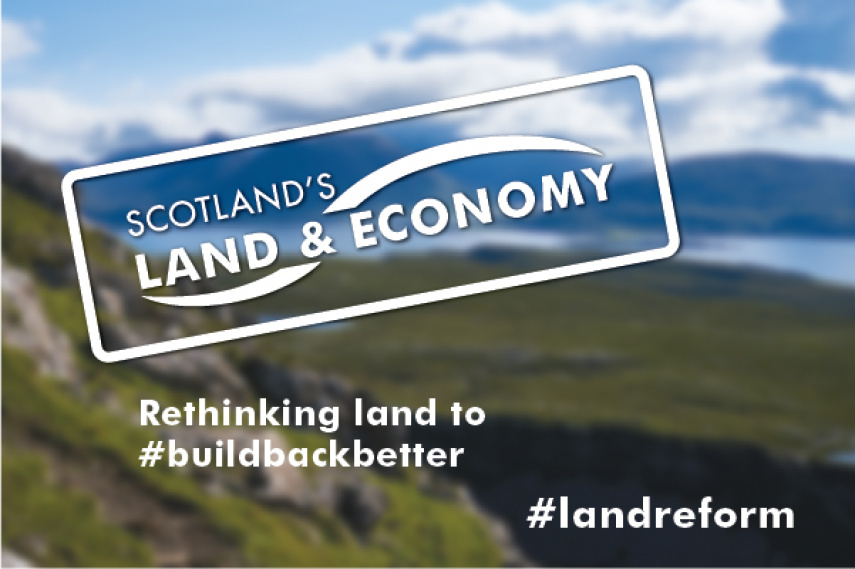
Balancing Land Rights and Responsibilities
Emma Cooper

As part of the ‘Scotland’s Land & Economy’ series exploring the fundamental role of land in achieving Scotland’s post-pandemic recovery and renewal, Head of Land Rights and Responsibilities Emma Cooper explores the balancing act required between land rights and responsibilities and how we can use the Land Rights & Responsibilities Statement – and our protocols – to realise economic, social and cultural rights in practice as we move towards a post-COVID-19 green recovery.
The Scottish Government’s Land Rights and Responsibilities Statement (LRRS) provides us with a set of principles through which we can understand how to balance land rights and responsibilities. We all have, in law, a right to own property and to privacy, but as Megan MacInnes explains, it is also legally recognised now that these individual rights must be balanced with the rights of others. That means that when exercising a right – such as to own land – you must consider how your actions impact on the rights of others.
In many ways it seems obvious that there are a whole range of economic, social and cultural rights which can be positively or negatively impacted on depending on how land is owned, managed and used. For example, we have rights to water, to adequate housing, to work, to adequate food and to health. All of these rights clearly rely on land being managed and used responsibly for wider public benefit, to produce food, provide uncontaminated water, to build housing on, provide work and economic opportunities, access to green spaces for exercise, and so on.
The COVID-19 pandemic and the impact it has had on our economy has highlighted the fragility of our society and brought the question of how to balance rights and responsibilities to the fore. Inequalities were made starker. Having access to outdoor greenspace, or a small garden or a space to grow food, became so important when our movements were restricted. Home-ownership status became an issue of national importance when thousands of tenants were threatened with eviction. We all had to balance our usual freedoms with our responsibilities to society to protect our own health and the health of others more vulnerable than us. We all have rights, so we all have responsibilities.
As restrictions ease and we look to the recovery phase, we cannot forget the lessons we have learned. The Scottish Government’s LRRS helps landowners and communities understand how land rights and responsibilities should be balanced. It is the first statement of its kind in the world and sets out for all types of landowners six principles to guide the ways in which they should fulfil their responsibilities and rights.
The Statement sets out what is means to be a ‘good’ steward of land, making balanced decisions which consider the interests of everyone in society. It seeks to rebalance the power relationship between landowners and communities, so that we all have a genuine say over decisions that impact us. It sets an agenda for diversifying landownership so that more people can own, manage and use land. Finally, the statement looks at ensuring land is used productively to ensure Scotland’s economy grows sustainably and inclusively – something which has never been more important than it is right now as we aim to recover from the COVID-19 pandemic.
Land in Scotland is used for many purposes which provide public benefit, but we need to do more if we are to overcome the impact of COVID-19 on Scotland’s economy and people. The Scottish Government initiated Advisory Group on Economic Recovery, chaired by Benny Higgins, emphasised the seriousness of the situation we face, and strongly highlighted the need for all sectors to work together urgently to “protect and create jobs, reduce inequalities by building a green and technology-led recovery, and make Scotland an attractive place to do business.”
Land is one of Scotland’s most important assets and there are many landowners who work with their local community for mutual benefit, developing the local economy in balanced and sustainable ways, and utilising land to meet local needs. But there is also land in both urban and rural Scotland which is not being used productively or for public benefit. Landowners must take proactive and balanced decisions to realise Scotland’s economic and wellbeing potential.
To help landowners and communities understand how they can practically deliver on their rights and responsibilities, and how they should expect each other to behave, we have published a series of protocols relating to key issues. These include community engagement, good stewardship and diversification of land ownership, and they relate directly to the principles outlined in the LRRS. More information on these, including training and supporting guidance, is available on our website.